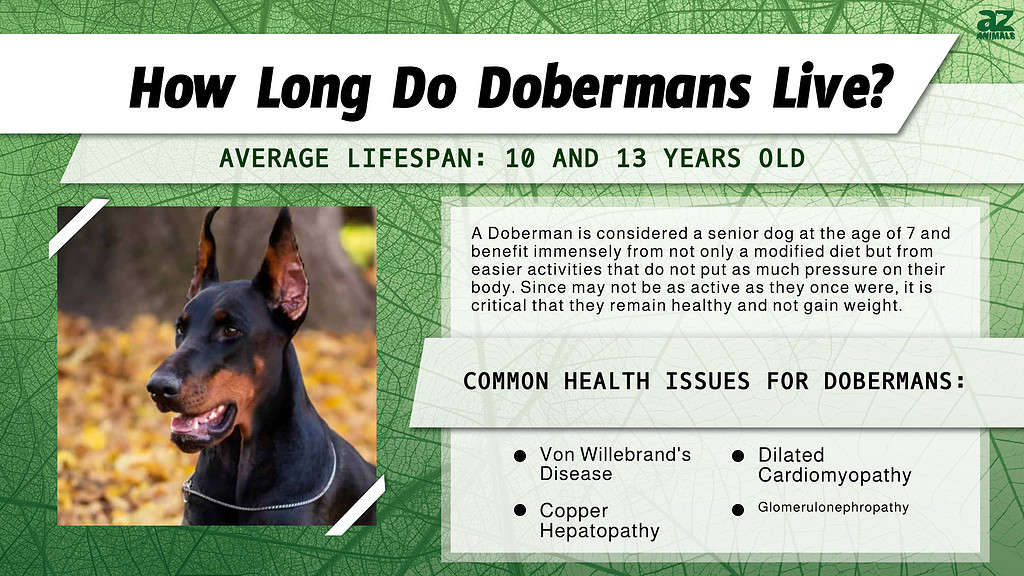When it comes to determining how old is old for a Doberman, it’s important to consider the breed’s average lifespan. Did you know that the average lifespan of a Doberman is around 10 to 13 years? This might come as a surprise to some, as Dobermans are often associated with strength and vitality. However, like all dogs, they too age and have different life stages that can impact their overall health and well-being.
Understanding the aging process of Dobermans is crucial in providing them with the care they need as they get older. As they age, Dobermans may start experiencing age-related health issues such as arthritis, reduced mobility, and hearing or vision loss. Regular veterinary check-ups, a balanced diet, proper exercise, and mental stimulation are essential to help them maintain their quality of life as they reach their golden years. By providing attentive care, we can ensure that Dobermans live their best lives for as long as possible.
Dobermans typically have a lifespan of around 10-13 years. However, it is important to note that age is not a determining factor for when a Doberman is considered “old.” Instead, their overall health and quality of life should be evaluated. When a Doberman starts showing signs of aging such as decreased energy, joint stiffness, or cognitive decline, it is important to provide them with appropriate care and support. Regular veterinary check-ups and a healthy lifestyle can help ensure their well-being as they age.

How Old is Old for a Doberman?
Aging is a natural process that affects all living beings, including animals. As dog owners, it’s important for us to understand the aging process in our beloved pets, such as Dobermans. Knowing how old is old for a Doberman can help us provide the best care and make informed decisions about their health and wellbeing. In this article, we will explore the factors that determine the lifespan of Dobermans and discuss what can be considered as old age for these loyal and intelligent dogs.
The Average Lifespan of a Doberman
On average, Dobermans have a lifespan of 10 to 13 years. However, there are several factors that can influence the longevity of a Doberman. These include genetics, nutrition, exercise, veterinary care, and overall lifestyle. By providing a well-balanced diet, regular exercise, and regular veterinary check-ups, you can help your Doberman live a longer and healthier life. It’s important to remember that individual dogs may vary and some Dobermans may live longer or shorter lives than the average.
Genetics play a significant role in a dog’s lifespan. Responsible breeders carefully select parent dogs with good genetic health to minimize the risk of hereditary diseases and conditions. By choosing a Doberman from a reputable breeder, you can increase the chances of having a healthy and long-lived companion.
Proper nutrition is essential for a Doberman’s overall health and longevity. Feeding a high-quality, balanced diet that meets their nutritional needs is crucial. Obesity can shorten a dog’s lifespan and increase the risk of various health problems, including heart disease, diabetes, and joint issues. It’s important to monitor your Doberman’s weight and adjust their diet as necessary to maintain a healthy body condition.
Regular exercise is also important for a Doberman’s physical and mental well-being. Daily walks, playtime, and interactive activities help keep them physically fit and mentally stimulated. Exercise can also help prevent obesity and maintain healthy joints and muscles. However, it’s essential to tailor their exercise routine to their age and physical condition, as older Dobermans may require gentle exercise options.
Signs of Aging in Dobermans
As Dobermans age, they may exhibit certain signs that indicate they are entering their senior years. These signs can vary from dog to dog, but here are some common indications of aging:
- Gradual decrease in activity level
- Joint stiffness or arthritis
- Weight gain or loss
- Changes in appetite
- Gray hair or coat thinning
- Dental problems
- Decreased vision or hearing
- Incontinence
- Behavioral changes
If you notice any of these signs in your Doberman, it’s important to consult with your veterinarian. They can provide guidance on managing age-related health issues and recommend appropriate treatments or lifestyle adjustments to ensure a good quality of life for your aging companion.
Caring for an Aging Doberman
As your Doberman enters their senior years, they may require some extra care and attention to maintain their health and well-being. Here are some tips for caring for an aging Doberman:
- Regular veterinary check-ups: Schedule regular check-ups with your veterinarian to monitor your Doberman’s health and detect any potential issues early.
- Well-balanced diet: Feed your Doberman a nutritious diet that meets their specific needs. Consider switching to a senior dog food formula that is formulated to support the health of older dogs.
- Weight management: Monitor your Doberman’s weight closely and adjust their diet and exercise accordingly to prevent obesity or excessive weight loss. Obesity can put additional strain on their joints and organs.
- Exercise routine: Adapt your Doberman’s exercise routine to their age and physical condition. Gentle exercise options such as swimming or shorter walks may be more suitable for older dogs.
- Dental care: Keep up with regular dental care, including brushing your Doberman’s teeth and providing dental treats or toys to help maintain their oral health.
- Comfortable environment: Provide a comfortable and safe environment for your aging Doberman, including soft bedding, easy access to water and food, and minimizing hazards or obstacles in their living area.
When is a Doberman Considered Old?
While there’s no specific age that can be classified as “old” for all Dobermans, they are generally considered to enter their senior years around 7 to 8 years of age. At this stage, they may start experiencing age-related health changes and may require adjustments in their care and lifestyle. Providing appropriate care and attention to your aging Doberman can help ensure their comfort, well-being, and overall longevity.
Key Takeaways: How Old is Old for a Doberman?
1. The average lifespan of a Doberman is around 10 to 13 years.
2. Many Dobermans start showing signs of aging around 7 to 9 years old.
3. Older Dobermans may experience health issues such as arthritis, heart disease, or cancer.
4. Regular exercise and a balanced diet can help slow down the aging process in Dobermans.
5. Regular visits to the veterinarian can help detect and manage age-related health conditions in Dobermans.
Frequently Asked Questions
Here are some commonly asked questions about the age of a Doberman:
1. At what age is a Doberman considered old?
A Doberman is generally considered old between the ages of 8 and 10 years. This is when they begin to show signs of aging and may experience certain health issues associated with older dogs. However, the lifespan of a Doberman can vary, and some may live beyond 10 years with proper care.
As a responsible owner, it is important to monitor your Doberman closely as they reach their senior years and provide them with the appropriate care and attention they need for a comfortable life.
2. How can I tell if my Doberman is getting old?
You can tell if your Doberman is getting old by observing certain signs and behaviors. These may include a decrease in energy levels, gray hair around the muzzle, stiffness or difficulty in getting up or lying down, weight gain or loss, changes in appetite, and a decrease in hearing or vision.
If you notice any of these signs in your Doberman, it is recommended to consult with a veterinarian for a proper examination and guidance on how to best care for your aging dog.
3. Are there any health issues that commonly affect older Dobermans?
Yes, older Dobermans are prone to certain health issues. Some common age-related health conditions in Dobermans include arthritis, hip dysplasia, heart problems, cancer, and vision or hearing loss. Regular veterinary check-ups and a healthy lifestyle can help detect and manage these conditions in a timely manner.
It is essential to provide your older Doberman with a balanced diet, regular exercise, and appropriate supplements or medications as recommended by the veterinarian to support their overall health and well-being.
4. How can I ensure a good quality of life for my older Doberman?
To ensure a good quality of life for your older Doberman, there are several important steps you can take. Providing a comfortable and safe environment, maintaining a balanced diet, and engaging in regular exercise are crucial.
Additionally, regular veterinary check-ups, vaccinations, and preventive care are essential to catch any health issues early and ensure timely interventions. Offering mental stimulation, love, and affection, as well as adapting activities and exercise routines to suit their abilities, can also contribute to a happy and fulfilling life for your older Doberman.
5. What can I do to support my older Doberman’s joint health?
Supporting your older Doberman’s joint health is crucial, especially as they may be more prone to conditions like arthritis. Regular exercise that is low impact, such as walking or swimming, can help keep their joints mobile and maintain muscle strength.
You can also provide joint supplements that are specifically formulated for dogs, such as glucosamine or chondroitin. These supplements can help support joint health and reduce inflammation. Additionally, providing a comfortable bed or orthopedic mattress can help alleviate any discomfort or pressure on their joints while they rest or sleep.

How Quickly a Doberman ACTUALLY Ages—Compared to Other Dogs
So, how old is considered old for a Doberman? While the lifespan of a Doberman can vary, generally speaking, a Doberman is considered old around the age of 10 to 12 years.
By this age, a Doberman may start experiencing signs of aging, such as a decrease in energy, mobility issues, and potential health concerns. However, with proper care and regular vet check-ups, many Dobermans can live well into their teenage years.
